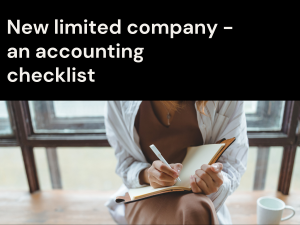Running your own limited company gives you more control over your own personal income, specifically when and how you pay yourself. This allows you to organise your personal remuneration in a more tax-efficient manner, such as receiving a director’s income through a PAYE salary and drawing shareholder dividends at frequent intervals or as company profits allow.
The term “shareholder” simply refers to the company’s owner(s). You can pay yourself a dividend if you own and control your limited corporation. Due to the lower personal tax paid on dividends, this might be a tax-efficient way to take money out of your company.
For some, the protection of restricted liability of a Limited company is a significant advantage. Others choose to be a limited company over a sole trader because of the potential tax benefits.
Our chartered accountants have put together this guide to help you understand the ways of how to pay yourself from a limited company, plus which one is best for you.
5 ways to pay yourself from a limited company
Taking a salary
There are two key reasons why you should accept a salary from your limited company:
It is considered an allowable business expense, which reduces the amount of Corporation Tax your company must pay.
If your salary exceeds the Lower Earnings Limit (£6,396 in the 2022/23 tax year and £6,240 in the 2021/22 tax year), you will accumulate qualifying years for your state pension.
Unless there is a contract of employment in existence, ‘office holders’ (those who occupy a position in a company but do not have a contract or get regular salary payments) are not liable to the National Minimum Wage Regulations, according to HMRC.
A low wage can be paid, which means you would not personally have to pay Income Tax or National Insurance Contributions (NICs) on the salary from the company.
Because wages are a deductible business expense, your company will not have to pay Corporation Tax on your director’s compensation. Corporation Tax is only levied on profits, or the money left over after paying/accounting for business overheads and other expenses.
Paying yourself through dividends
Directors who receive dividend payments must pay Income Tax on amounts in excess of the £2,000 Dividend Allowance every year (note the £2k allowance is set to fall by £500 for tax year 2023/24). The tax rate will be determined by the individual’s income tax bracket. Dividend payments, on the other hand, are taxed at a lower rate than salary payments, with the present rates being as follows:
- £12,571 to £50,270 (Basic rate) – 8.75%
- £50,271 to £150,000 (Higher rate) – 33.75%
- Over £150,000 (Additional rate) – 39.35%.
Dividends, unlike salaries, are not considered a company expense and hence cannot be deducted from your Corporation Tax payment. Dividends are instead paid out of profits, which implies that corporations have already paid the 19% Corporation Tax bill on that money before it is handed to shareholders. This explains the tax-free Dividend Allowance and lower Dividend Tax rates.
Directors loans and expenses
A director’s loan is any money you borrow from your company that is not a salary, dividend, or allowed expense. These loans can also be used to lend money to your firm, for example, to purchase equipment or to aid with temporary cash flow concerns.
When you borrow money, such loans must eventually be returned but they can provide for tax-free borrowing in the short term.
If the money is not repaid then S455 tax is calculated on the Corporation Tax Return at a rate of 33.75% on the balance of the loan which is still outstanding 9 months after the company’s fiscal year end. When the director’s loan is returned, any S455 tax paid will be refunded to you.
S455 is thus effectively a holding tax.
Pension contributions
Investing in a pension fund is one of the most tax-efficient ways to pay yourself from a corporation. Making pension payments reduces Corporation Tax — as long as they are less than the annual allowance for tax-free pension contributions, which is presently £40,000.
Furthermore, if money is taken out of a pension pool (when allowed – usually not before the age of 55), 25% of the amount taken is tax-free.
Employment Allowance
The Employment Allowance is a program that enables limited enterprises whose employers’ Class 1 National Insurance liabilities in the previous tax year were less than £100,000 to lower their yearly NICs by up to £5,000 every tax year.
It cannot be claimed by companies with only one employee earning more than the Class 1 National Insurance secondary threshold and who is also a director of the company. In other words, sole directors who operate alone cannot claim it.
So, what is the best way to pay yourself from a limited company?
Taking all of the following taxes into account, it is normally tax-efficient for most limited company directors to receive a monthly pay up to the NI Primary threshold of £992.33 per month, or 11,908 per year, in the 2022/23 tax year.
Companies with just one employee may prefer to pay up to the NI Secondary threshold, which is £758.33 per month, or £9,100 per year to avoid having to pay employers NI too.
If you pay yourself a salary from your limited company up to the relevant National Insurance threshold, you will not have to pay tax such as Income Tax or employee National Insurance contributions on it as long as it is your sole source of income. We normally recommend this choice because it is tax efficient. As previously stated, there may be reasons why you opt to give yourself a greater wage, particularly if your company undertakes qualifying R&D .
As a company director, you can set your own remuneration, but you should seek guidance from a specialist accountant to ensure you’re paying yourself in the most tax-efficient way possible.
Limited company accounting and tax advice from Raw
For any limited company owner, it’s crucial to enlist the help of an expert accountant who can guide you through whether you should be taking a salary or dividends from your company. Our chartered accountants have a wealth of experience in this field, and you’ll even get a dedicated accountant assigned to your case.
Take a look at all of our services today:
Contact us today for a free no obligation chat!
How to pay yourself from a Limited Company FAQs
Do I have to pay myself a salary as director of a limited company?
As a director, you have more options for how you pay yourself and, depending on your circumstances, you may be able to decrease your tax obligations. The amount you take from the firm, as well as the ratio of salary to dividends, will be determined by your own requirements and circumstances.
How do I pay myself dividends for a limited company?
If you or your fellow directors decide to take dividends or distribute them to shareholders, you must call a meeting of directors and secure an agreement to ‘declare a dividend’. The agreement should be recorded in the meeting minutes, and take account of profits available for distribution. The company must retain a record of the directors’ decision.
Can you take dividends and no salary?
Dividends cannot be paid if there is no profit. Dividends can be paid to directors and other shareholders based on the number of shares they own if profits are available. There is no obligation to distribute all or even any of the profits as dividends. It is possible to take dividends and no salary from the company but you should consult a specialist accountant to ensure this is tax efficient.






